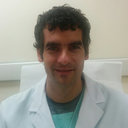Leiden mutation (as genetic) and environmental (retinoids) sequences in the acute and chronic inflammatory and premalignant colon disease in human gastrointestinal tract.
Ključne riječi
Sažetak
BACKGROUND
Tumor, calor, dolor, pallor and functio laesa are together involved in the different acute and chronic inflammatory processes. The processes involved in the inflammation are determined by differently acquired and hereditary factors. Recently the presence of a new genetic marker (Leiden point mutation) was found in Crohn's disease and ulcerative colitis. On the other hand, the GI mucosal integrity was proven on gastrointestinal mucosal damage to be produced by different chemicals, xenobiotics, drugs. In human observations, the serum level of retinoids (vitamin A, lutein, zeaxanthin, alpha-, beta-carotene) was proven in patients with chronic gastrointestinal inflammatory bowel disease. The aims of this study were (1) to measure the prevalence of Leiden mutation; (2) to identify the changes in the serum retinoid level in patients with Helicobacter pylori infection of the stomach (n=24), hepatitis C infection (n=75), ileitis terminalis (Crohn's disease; n=49), ulcerative colitis (n=35), colon polyposis (n=59) and adenocarcinoma in colon polyps (n=9), and 57 healthy persons were used in the control group; (3) to compare the directions of the changes in the measured parameters in the acute (H. pylori and hepatitis C infections), chronic (ileitis terminalis, ulcerative colitis) GI inflammatory diseases and in colon polyposis without and with malignisation.
METHODS
The Leiden mutation was measured by the method of polymerase chain reaction, the retinoid level in the patient's serum was measured by high liquid cromathografic method (HPCL).
RESULTS
(1) It has been found that the prevalence of Leiden mutation increased significantly in patients with ileitis terminalis (P<0.001), ulcerative colitis (P<0.001), colon polyposis (P<0.001) and with colon polyps with malignisation (P<0.01). (2) Serum level of vitamin A and zeaxantin were decreased significantly in all group of patients except for the group with H. pylori infections. (3) alpha- and beta-carotenes were found to be practically at the same level as those in the control groups, except in patients of colon polyps with malignisation. (4) The vitamin A, lutein, zeaxantin, alpha- and beta-carotenes were decreased in patients with ileitis terminalis.
CONCLUSIONS
(1) The essential role of retinoids (carotenoids) as environmental factors are suggested for keeping GI mucosal integrity in human healthy subjects and patients. (2) Leiden mutation, as a genetic marker, can be used in the screening of patients with ileitis terminalis, ulcerative colitis and colon polyposis (without and with malignisation). (3) An opposite direction can be found between the increased prevalence of Leiden mutation and decrease of serum levels of retinoids in group of patients with ileitis terminalis, ulcerative colitis and colon polyposis (without and with malignisation).



